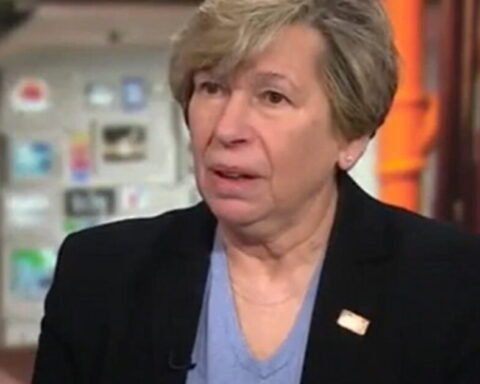Kwik Kopy’s CEO Sonia Shwabsky says the ubiquity of the online world, powered by Google and Facebook, is compelling business owners and marketing managers to rethink how they connect with customers.

Instead, a renewed yearning for face-to-face interaction in the post-COVID years is galvanising the fortunes of one of Australia’s longest-running franchise brands.
Unlike other businesses struggling or closing due to the cost of living crisis—and amid high inflation pushing up business costs—the printing company is looking at expanding.
“I don’t think there’s a move away from [Google and Facebook’s online advertising]. I think people are just evaluating it more diligently than before,” she told The Epoch Times.
“One of the things we’ve been seeing is digital advertising is costing a lot more. It’s having less effect than what it used to. I think the effectiveness of emails, and all of these electronic data-driven advertising or communication tools, I think they’ve kind of had their heyday,” Ms. Shwabsky said.
The two tech giants are estimated to absorb 58 cents (US$0.39) of every dollar of digital advertising spent in Australia, according to the Australian Competition and Consumer Commission (ACCC).
Their popularity has also driven up the unit price of advertising over the years.
“I came over from being a [chief operating officer] in the U.S. at a digital marketing agency, and at the time, I was there drinking the Google Kool-Aid,” Ms. Shwabsky said.
“Google and Facebook have really put a lot into this narrative, and I think other areas of marketing have just got to stand up and say, ‘Hang on.’”
The CEO said there was a lot at play in the digital space, particularly with the advent of artificial intelligence, which could compel people to use the internet in different ways.

A 3D-printed logo of Facebook’s parent company Meta is seen in front of the Google logo in an illustration on Nov. 2, 2021. (Dado Ruvic/Reuters)Kwik Kopy currently has 91 stores across Australia and is planning another 30. Its overall goal is to have 120 stores with 11 in regional areas, and 32 in suburban spots.
Kwik Kopy provides design and printing for business cards, signage, and brochures.
The management team also hopes to ramp up revenue by 10 percent from its pre-COVID performance. The brand currently pulls in $77 million per year.
The business praises the performance of its franchise network, particularly local owners who are grounded in the social fabric of their regions, notably stores such as Penrith, North Sydney, and Perth.
Interest in Physical Engagement
CEO Ms. Shwabsky says on another front, her company is riding a wave of renewed interest in face-to-face events and customised physical products.
“If you think about all the online businesses now, like e-commerce, the only physical touchpoint your brand has with a consumer is through that unboxing experience and what they receive in the mail,” said Ms. Shwabsky.
She says the demand for personalisation has increased noticeably in the last five years and has driven Kwik Kopy’s short run packaging (small volume order) business.
“Personalisation, as well as an increase in quality, while also making sure the experience is of the quality to represent your brand [has become important]—because it’s the only other touch point besides the computer.”

The front entrance of a Kwik Kopy store in Hurstville, Sydney Australia on July 3, 2024. (A. Chiang/The Epoch Times)Kwik Kopy’s boss also said that in the post-pandemic era, the downsizing of commercial offices—as companies reorganise to facilitate working from home—has also been a boon.
“What do you need to do when you move offices or change your office environment? You need more signage in your office, you need to make your office feel more welcoming to get people to return,” Ms. Shwabsky said.
“The other area coming out of COVID that’s been reignited—and we’ve done a lot of studies with marketing buyers and where they’re spending their money—is they are investing at a greater rate in face-to-face events,” she added.
The CEO said demand for events-related collateral means more sales of pull-up banners, paper handouts, or branded merchandise.
“While there may be downturns and staff cuts, businesses still need to think about their marketing dollars,” she said. “You’ve just got to be more careful about what’s really going to have impact for your business.”
Her comments come as a string of major brands in Australia cut back or downsize their operations amid a range of challenges engulfing the business sector.
Business Environment Beset on All Sides
Centre-right Liberal Party MP Casey Aaron Violi last month blamed the Fair Work Commission’s decision to raise the minimum wage on Labor government policy contributing to high inflation.
“It is the equivalent of burning someone’s house down, taking them a casserole for dinner and saying: ‘Sorry I burnt your house down, here’s a casserole, please be thankful, please be grateful,’” he said in a criticism of the government.
Higher wage bills are only one area the business sector is contending with, another is soaring electricity costs, worker shortages, and the ever-expanding regulatory burden.
In early June, the Florida-based Carnival Corporation made the surprise decision to shelve 90-year-old Australian cruise brand, P&O Cruises, citing significant red tape eating into the company’s margins.

A partial view of the Pacific Explorer cruise ship operated by P&O Cruises, departing from the Overseas Passenger Terminal on June 6, 2024, in Sydney, Australia. (Jenny Evans/Getty Images)“Given the strategic reality of the South Pacific’s small population and significantly higher operating and regulatory costs, we’re adjusting our approach to give us the efficiencies we need to continue delivering an incredible cruise experience year-round to our guests in the region,” Carnival CEO Josh Weinstein said.
At the same time, a major Australian fruit processor, SPC, announced it would cut back its order of local peaches and pears by 40 percent, a move likely to ripple through the wider growing industry.
The Victorian-based global exporter said sales had dropped because customers were shifting to cheaper Chinese and South African imports due to cost of living pressures.
The company hopes the situation can normalise by 2026.
Across the wider business sector, the picture is not optimistic either, with CreditorWatch finding insolvencies up 38 percent over the year to May 2024, and 41 percent above the pre-COVID period, according to ASIC data.
Among the industries, utility businesses involved in electricity, gas, water, and waste were the hardest hit recording an 89 percent increase in insolvencies on the previous year.
This was followed by education (87 percent), mining (72 percent), construction (46 percent), and retail trade (46 percent).
“We have known for some time now that consumers have pulled back on spending quite dramatically as high interest rates and inflation smashed household budgets,” said CreditorWatch chief economist Anneke Thompson, in a statement.
“This trend took some time to flow through to businesses but is now showing up in the data in the form of increasing late payment rates and rising court actions, as well as increased business failures and insolvencies.”
Source: ZeroHedge News
Disclaimer: TruthPuke LLC hereby clarifies that the editors, in numerous instances, are not accountable for the origination of news posts. Furthermore, the expression of opinions within exclusives authored by TruthPuke Editors does not automatically reflect the viewpoints or convictions held by TruthPuke Management.






